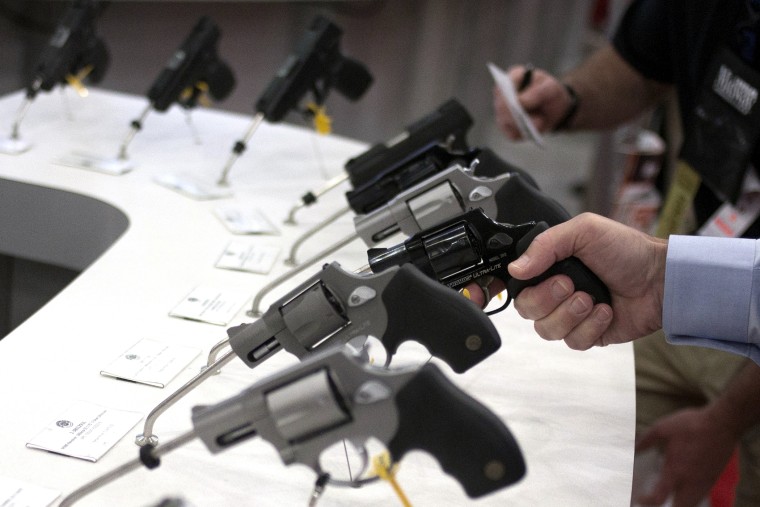I've been reading polls for quite a while, and I don't recall ever seeing an issue on which 97% of Americans agree. We're a big, diverse country, with all kinds of competing ideas, which lead to contentious fights, so the idea that 97% of us can agree on a controversial issue simply seems unrealistic.
It's one of the reasons the latest national Quinnipiac University poll stood out.
American voters support stricter gun laws 66 - 31 percent, the highest level of support ever measured by the independent Quinnipiac University National Poll.... Today's result is up from a negative 47 - 50 percent measure of support in a December 23, 2015, survey by the independent Quinnipiac University Poll.Support for universal background checks is itself almost universal, 97 - 2 percent, including 97 - 3 percent among gun owners.
The same poll went on to note that two-thirds of Americans support a nationwide ban on the sale of assault weapons; two-thirds of Americans believe it's too easy to buy a gun in this country; and 83% support a mandatory waiting period for all gun purchases.
Meanwhile, 75% of Americans believe Congress "needs to do more to reduce gun violence."
And yet, one need not be a cynic to be skeptical about the legislative prospects of meaningful reforms to our gun laws. At least for now, Republicans control the levers of federal power -- which means the odds of modest changes are poor, and the odds of dramatic changes are significantly worse.
We talked a bit yesterday about the structural considerations that lead Republicans to frequently ignore the wishes of the American mainstream, but the Quinnipiac results bring the issue into sharper focus: we're not just talking about an issue with broad popularity; issues like universal background checks have the backing of nearly the entire country.
So why aren't political leaders rushing to deliver results on the only issue on the landscape that has the backing of 97% of the public? It's probably because they believe polls like these only offer part of the story.
Remember, after the massacre at Sandy Hook Elementary, there was a bipartisan bill on the Senate floor to expand background checks. It enjoyed enormously broad public backing, but it nevertheless died at the hands of a Republican filibuster.
Two years later, voters handed the GOP control of the Senate. Two years after that, voters put the NRA's allies in complete control of the federal government.
What's popular matters, but what matters more is what actually motivates the American electorate to cast a ballot. It's startling to see an issue on which 97% of the public agrees, but what fraction of that 97% are prepared to base their vote on it?
In other words, there's a difference between issues that have broad but thin support, and issues that have narrow but deep support.
The new Quinnipiac data shows Americans support stricter gun laws by a greater than two-to-one margin, 66% to 31%. But politicians also know that those 31% aren't just committed to their cause, they're also going to show up on Election Day, with this issue at or near the top of their priority list.
The two-thirds of the public that wants new restrictions may be sincere, but their support may also be superficial. The issue isn't necessarily determinative.
It's possible, of course, that the assumptions are out of date. Maybe the politics have changed, and this is the year much of the public moves the gun issue from the background to the foreground. Perhaps proponents of new gun laws will be every bit as passionate and organized as their foes on the far-right, and the politics of the numbers game will play in their favor.
But I suspect a whole lot of Republican policymakers are prepared to gamble that the politics haven't changed enough to matter.
